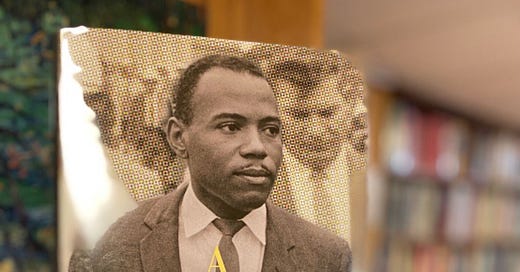Defying Giants: The Unyielding Spirits of Hank Rearden and James Meredith in the Face of Power"


The juxtaposition of Hank Rearden from Ayn Rand's "Atlas Shrugged" and James Meredith, the civil rights activist and author of "A Mission from God," offers a fascinating exploration of radical thinking and the quest for individual freedom in the face of societal constraints.
Both figures, the former fictional and the latter one real, embody the spirit of defiance and the relentless pursuit of one's convictions, despite the immense pressures exerted by powerful leaders and the structures of control prevalent in their respective worlds.
Hank Rearden, a self-made steel magnate, operates under the guiding principle of living for his own sake, rejecting societal demands that he sacrifice his interests for the "common good." His creation, Rearden Metal, symbolizes the pinnacle of human achievement and individual effort, yet it becomes a target for those who seek to redistribute success in the name of equality.
Rearden's struggle against the collectivist ethos mirrors the broader thematic conflict in "Atlas Shrugged" between individualism and collectivism, highlighting the dangers of a society that stifles innovation and entrepreneurship in the name of control and uniformity.
In parallel, James Meredith's life and activism offer a real-world embodiment of the fight against systemic control and the assertion of individual rights. Meredith became the first Black American to attend the University of Mississippi in 1962, a monumental step in the civil rights movement, challenging the deeply entrenched racial segregation and discrimination in the United States.
His autobiography, "A Mission from God," recounts his journey, emphasizing his determination to confront and dismantle the oppressive power structures that sought to limit the freedom and potential of Black Americans. Meredith's actions, driven by a profound belief in the power of individual action to effect change, resonate with Rearden's fictional struggle for personal autonomy against societal constraints.
Both Rearden and Meredith confront powerful leaders and systems designed to maintain control over individuals, yet their responses highlight a shared belief in the value of personal integrity and the pursuit of one's ideals.
Rearden's resistance against the government's attempts to control his business and suppress his innovation is a testament to his unwavering commitment to his values and the principle of individual achievement.
Similarly, Meredith's courage in the face of violent opposition and legal barriers reflects his deep conviction that one's moral compass must guide action, even when such action challenges the status quo.
The parallels in their radical thinking underscore a fundamental philosophical question: what is the role of the individual in society? Both figures champion the idea that true progress and prosperity stem from the unfettered ability of individuals to pursue their passions and interests, free from coercive control.
This perspective is particularly relevant in contemporary times, where debates about the balance between individual freedom and collective responsibility continue to dominate political and social discourse.
The legacy of Rearden and Meredith invites us to reconsider the ways in which power and control are exercised and resisted, urging a reevaluation of the values that underpin our societal structures.
In a world where powerful leaders and institutions often exert influence over the masses, the stories of Hank Rearden and James Meredith offer a compelling reminder of the transformative potential of individual agency. Their lives and philosophies challenge us to think critically about the nature of authority, the importance of self-determination, and the enduring struggle for freedom and justice.
As we navigate the complexities of modern society, the radical thinking embodied by these two figures serves as a beacon, illuminating the path toward a future where individual liberty and collective well-being are not mutually exclusive but are instead harmoniously intertwined.
I believe that the exploration of Hank Rearden's and James Meredith's philosophies reveals a profound commentary on the enduring human quest for autonomy and purpose in the face of oppressive forces. Their stories, though separated by the realms of fiction and reality, converge on the principle that the strength of the individual spirit can challenge and ultimately reshape the structures of power and control.
As we reflect on their legacies, we are reminded of the importance of standing firm in our convictions, pursuing our visions of a better world, and resisting the temptation to succumb to the easier path of conformity and submission. In doing so, we honor the radical thinking that has, time and again, propelled humanity forward, challenging us to envision and work towards a society that values the potential and dignity of every individual.
Your Invitation
Thank you for joining me here at “Great Books, Great Minds," where your passion for books takes center stage. This endeavor is more than a project; it's a labor of love that's driven by countless hours of research and writing. It's my way of contributing to a world filled with community, connection, and meaningful conversations, all nurtured by the power of literature.
If you've found this digital newsletter to be a source of inspiration and insight, if you relish the opportunity to explore exceptional books alongside remarkable authors and fellow book enthusiasts, then I'd like to extend a special invitation to you.
Join our community as a valued supporting member with a subscription at just $6.00 per month or $60.00 per year. By supporting the world of independent writing you are helping us in our ongoing quest to create compelling experiences between you and the authors that we regularly feature.





I am very familiar with Rearden but I've never heard of Meredith.